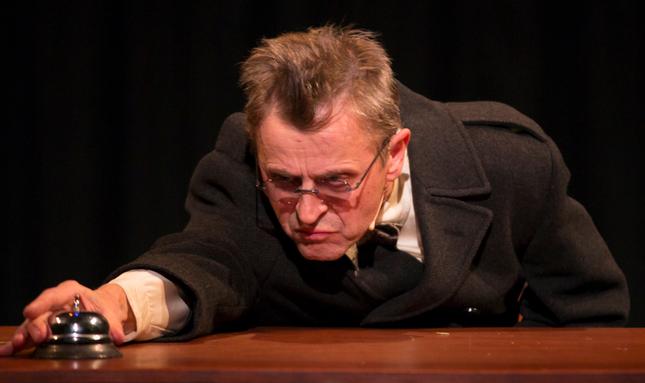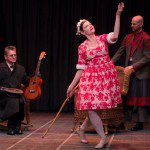Baryshnikov Propels ‘Man in a Case’ at Shakespeare Theatre
By • December 10, 2013 0 1116

I kept thinking, as I watched Mikhail Baryshnikov navigate the stage of the Lansburgh Theatre in “Man in a Case,” a theater piece from the Washington Shakespeare Theatre Company by way of the Hartford Stage in Connecticut, what this might be like without him.
Watching him move, gesture, do no more than a 30-second series of moves to the blues, a little skip-and-glide, watching him collapse on a bed, or put something yearning and languid in a tentative gesture of unfulfilled love, you remember who he is. At the same time, you see him as the men on stage, you get a little lost in the Chekhov stories he inhabits along with a wonderfully eclectic and eccentric cast of performers.
It’s all a little puzzling, this echo of other lives and identities. A young woman, kind of Chekhovian in a loose scarf, confessed that she was a little confused, as she walked out of the theater with her companion. “Don’t worry, sweetheart,” he said. “It’s just Chekhov.”
That it is, but it’s also a little more than that. This is the work of Annie-B Parson and Paul Lazar of Big Dance Theater, who combine dance, theatre and video and achieve an effect that makes audience members feel more like casual witnesses. It’s an odd effect. When you walk in, you see folks at a long wooden table, there’s pop music—Petula Clark?—the people are hunters, who begin to talk about the efficacy of wild turkey calls.
Videos end up on screens, on tables, they’re tools to broaden the story, make faces and feelings bigger, but like the later Carly Simon song, seem to be not so much tools as toys after a while. They’re —lookee here—echoes of ourselves, because, you think, surely these characters don’t know the music.
The piece—and it is more piece than outright, formal play—is a riff on Chekhov’s riffs on love in two of his short stories: “Man in A Cage” about a professor of Greek in a school in a small obviously Russian village and “About Love” about a man with a married woman. In the end, well, it is just Chekhov.
Baryshnikov plays the headmaster who is most at home within the strictures of rules, habit, the strait jacket of allowed behavior as well the poetry of government circulars. He narrates this tale of a love affair that only Chekhov could write properly and brings another dimension to things. The dimension that Baryshnikov brings—he is a small, but always charismatic, presence—is the Russian echo to the two stories. He came to the West from a repressive system and a world where a break in the order of things was ominous. Now, the ballet prince and king is a majordomo.
The Greek master professor is an object of both derision and fear. It’s as if everyone knows he’s taking notes on changes in the emotional and intellectual, the behavioral atmosphere, this figure in a dark coat, awkward and clumsy, at one point clumsily being pushed to dance. Imagine that: a clumsy, awkward Baryshnikov.
It’s what makes him scary in the end, until, inevitably, he meets a girl whom he’s expected to marry. She undoes him bit by bit with laughter, a kind of fleshy silliness. She’s a disturbance in the field who causes him an ultimate kind of embarrassment until he’s still. That again is hard to think about: him still unto death.
In “About Love” is carried by his languid narrative voice. It’s a tale of circumstance that is so peculiarly Russian, evoking not the Soviet system, as the first might have, but Pushkin, Chekhov, even mad Tchaikovsky. In the telling, sometimes taken up by others, the man describes his growing love, unrequited, and what it does to the woman in question.
Taken together, the man in the case, wrapping his heart into cold confusion with pamphlets and routine and the man and the woman and the love they lost are both like a dance, choreographed between here and now and where they came from. Something about it all is highly affecting, beguiling, sad and human—not the least of which is the presence of Mikhail Baryshnikov. And that’s not just Chekhov.
“Man in a Case” runs through Dec. 22 in the Shakespeare Theatre Company’s Lansburgh Theatre at 450 7th St., NW.
- Mikhail Baryshnikov in “Man in a Case.” | Photo by T. Charles Erickson



